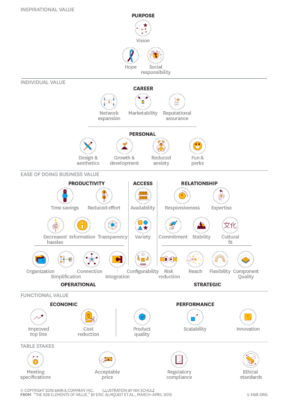Many B2B purchasing decisions are complex. On the one hand, your product or service must solve real problems for an organization. On the other hand, it must meet the personal needs of the people involved in the purchase process. It gets even more complex when you realize that there are several people involved in the purchase decision and their personal needs are often different.
As individuals, we are exposed to many technology products and services in our personal lives. Consumer companies are much better at providing a great customer experience and creating products we love to use. Indeed, the consumer market drives our expectations when it comes to business purchases. We cannot easily turn off our high expectations in a work-related environment. Nor should we. Our personal expectations and preferences affect how we evaluate products and services for our companies.
How can we build solutions that meet organizational needs as well as fulfill individual values? This is what sets iconic B2B companies apart from everyone else.
What I’ve noticed is that B2B companies often communicate surprisingly similar values to potential customers: ease of use, time savings, cost reduction, revenue growth, risk reduction, and so on. Some variations of these values are reported by almost all B2B companies. What’s difficult is seeing a company proactively address the needs of individuals within an organization.
The most useful work on the intersection of corporate and individual values in B2B markets comes from research conducted by Bain & Company. In an HBR article, Eric Almquist, Jamie Cleghorn, and Lori Sherer summarize and categorize 40 distinct values in B2B offerings, categorized into 5 levels.

Source: B2B Value Pyramid
This Value Pyramid helps you understand how B2B offerings can fulfill both objective organizational values and individual and personal values. When designing an ideal customer profile, you want to outline how customers perceive your business and personal values. Listen carefully as they describe the benefits your product or service offers and what they get beyond the features and functionality.
Business values are easy to measure because they are usually based on metrics, reasoning, and logic that are somewhat objective. Personal values are much harder to identify and communicate. That’s why you need to develop empathy for your customers.

 Português
Português Português
Português
